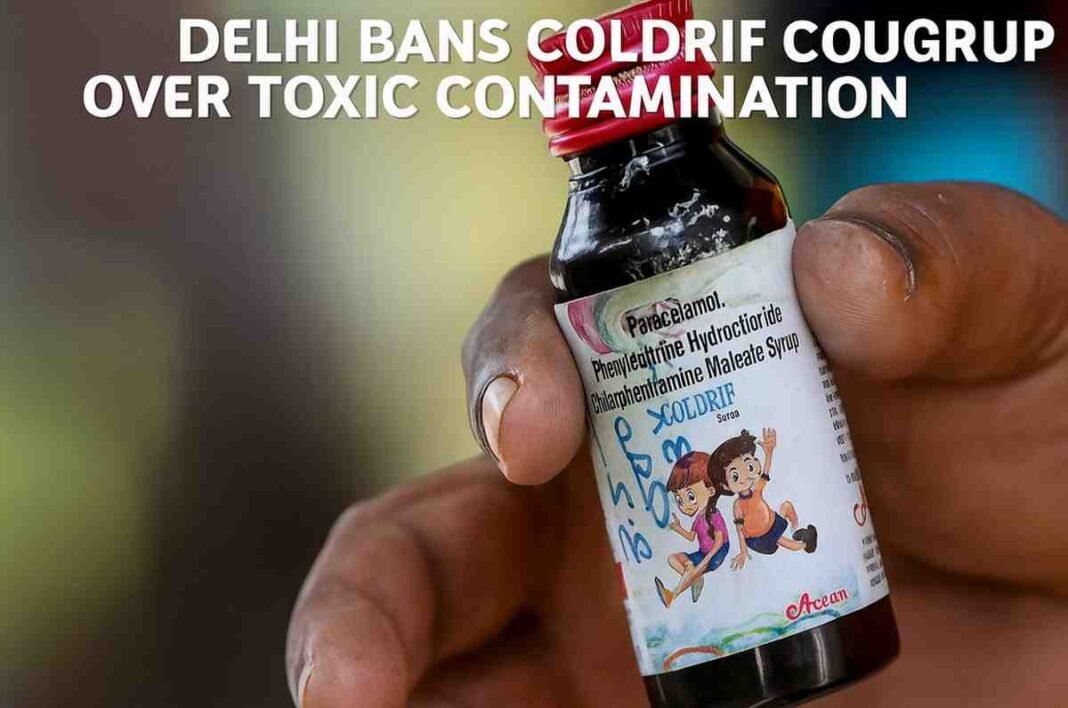Delhi Bans Coldrif Cough Syrup Over Toxic Contamination
In a significant public health move, the Delhi government has banned the sale, purchase, and distribution of Coldrif Cough Syrup after it was found to be “not of standard quality” due to contamination with a toxic chemical. The order, issued by the Directorate of Drugs Control, has directed all pharmacies, distributors, and healthcare facilities in the national capital to immediately withdraw the product from their shelves and refrain from further sales.
According to the official notification released on Friday, the tested batch of Coldrif Syrup—manufactured in May 2025 by Sresan Pharmaceutical Manufacturer, Tamil Nadu—was found adulterated with Diethylene Glycol (46.28% w/v), a hazardous chemical known to cause severe poisoning, organ failure, and even death when ingested. The syrup contains a combination of Paracetamol, Phenylephrine Hydrochloride, and Chlorpheniramine Maleate, typically prescribed to relieve symptoms of cold, cough, and fever.
Laboratory Findings and Toxicity Concerns
The contamination came to light during routine quality testing conducted by the Delhi Drug Control Department. Laboratory analysis revealed an unusually high concentration of Diethylene Glycol—a compound that has been historically linked to mass poisoning incidents worldwide. This chemical, often used as an industrial solvent or antifreeze component, is strictly prohibited for use in medicines and pharmaceutical formulations.
Health experts have warned that ingestion of Diethylene Glycol, even in small quantities, can cause serious harm, including acute kidney injury, liver damage, metabolic acidosis, and neurological complications. Symptoms of poisoning may include nausea, vomiting, abdominal pain, dizziness, and respiratory distress, which may progress to multi-organ failure if untreated.
Immediate Ban and Advisory
Following confirmation of the contamination, the Delhi government swiftly moved to impose a complete ban on the sale, purchase, and distribution of the affected batch of Coldrif Syrup. The official order emphasized the urgency of preventing further exposure, instructing chemists and distributors to discontinue the product immediately.
“The product has been declared ‘not of standard quality’ and found adulterated with toxic chemicals harmful to human health. Therefore, all stakeholders are hereby directed to stop sale and distribution of the said batch with immediate effect,” the order stated.
In addition, the public has been advised to avoid using Coldrif Syrup and to report any adverse health effects to the nearest medical facility or drug control office. The government also sought the cooperation of pharmacists, healthcare workers, and the general public for wide dissemination of the advisory to ensure safety and compliance.
Previous Incidents and Regulatory Vigilance
This incident is not the first time an Indian-manufactured cough syrup has come under scrutiny for contamination. In recent years, similar cases have been reported where pharmaceutical products containing Diethylene Glycol were linked to child fatalities in countries such as Gambia and Uzbekistan. These tragedies prompted global attention on drug manufacturing practices and quality control in the pharmaceutical sector.
Public health advocates have stressed the need for stronger regulatory oversight, improved laboratory infrastructure, and stricter enforcement of Good Manufacturing Practices (GMP) to prevent recurrence of such incidents. The Delhi Drug Control Department has reiterated its commitment to intensify random testing and inspection drives to safeguard consumer health.
Manufacturer Under Investigation
Authorities have initiated an investigation into Sresan Pharmaceutical Manufacturer, the Tamil Nadu-based company responsible for producing the contaminated batch. The probe aims to determine the source of contamination, assess compliance with quality control standards, and identify possible lapses in manufacturing processes.
If found guilty of violating drug safety norms, the manufacturer could face severe penalties, including suspension of license and criminal proceedings under the Drugs and Cosmetics Act, 1940. Officials have also alerted other states and the central drug regulatory body to trace whether the same batch was distributed beyond Delhi.
Public Health Priority
The Delhi government has reaffirmed that protecting citizens from unsafe and substandard drugs remains a top priority. Officials have urged the public to remain vigilant, check medicine batch numbers before use, and rely only on verified pharmacies.
As investigations continue, this incident serves as a stark reminder of the critical importance of drug quality assurance and the need for constant vigilance in India’s vast pharmaceutical supply chain.








